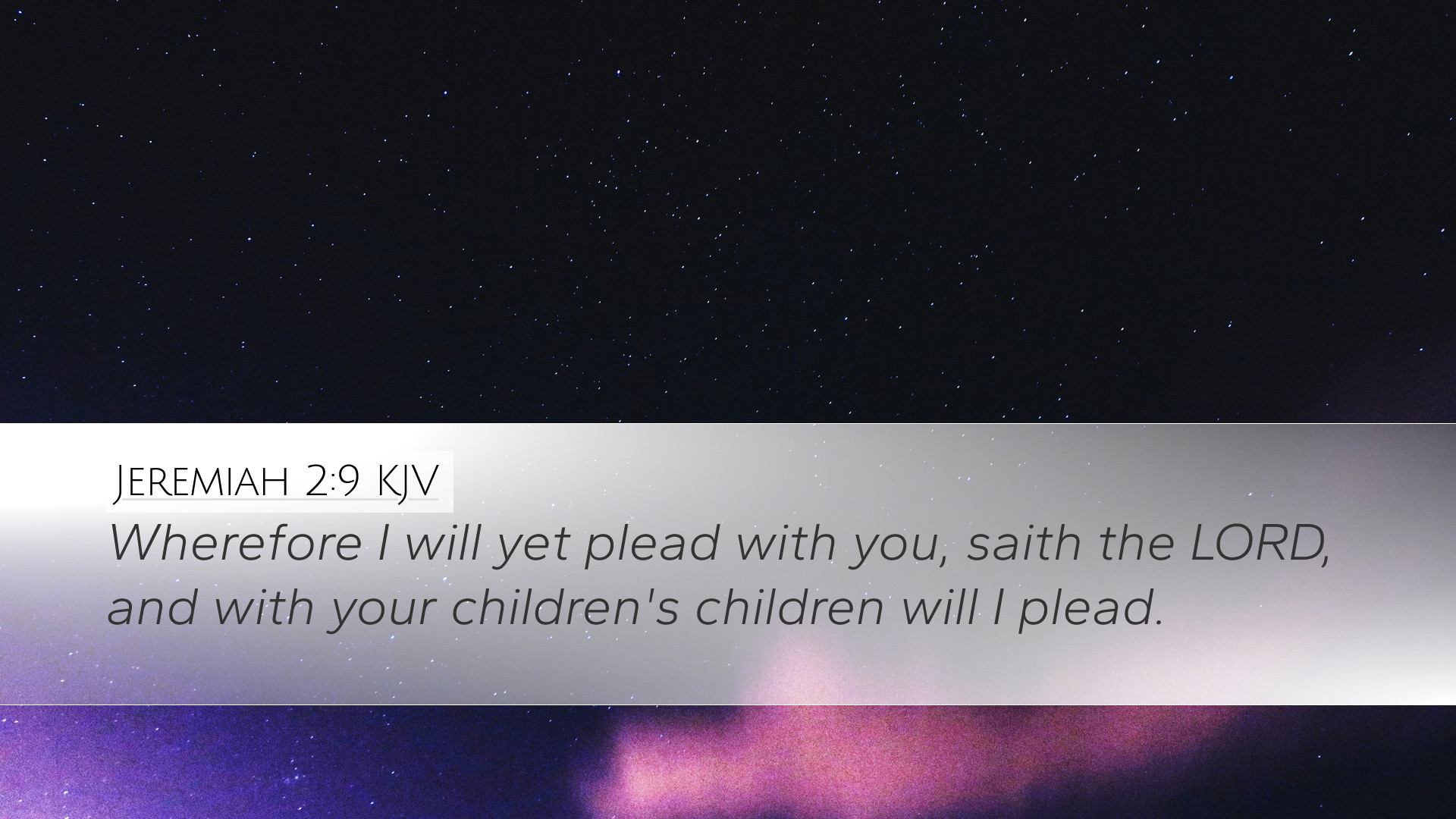Commentary on Jeremiah 2:9
Verse: Jeremiah 2:9 - "Wherefore I will yet plead with you, saith the Lord, and with your children's children will I plead."
Introduction
This verse is a pivotal reflection of God's desire to engage with His people even amidst their disobedience. As we explore Jeremiah 2:9, we delve into a rich tapestry of theological insights regarding God's character, the nature of sin, and the call to repentance. The commentaries of Matthew Henry, Albert Barnes, and Adam Clarke provide a comprehensive look at this essential scripture.
The Divine Plea
God’s Advocacy: Matthew Henry emphasizes the notion of God pleading with His people. His commentary suggests that God is not only sovereign but also seeks a relationship with His creation. This advocacy displays God’s patience and relentless nature in calling back His people to righteousness.
Generational Impact: Henry also remarks on the generational aspect of God’s pleadings, noting that God is not only addressing the present generation but extending His call to future generations—“with your children's children.” This serves as a reminder that the ramifications of one’s actions can ripple through time, affecting descendants.
The Nature of Israel's Sin
Idolatry and Abandonment: Albert Barnes points out Israel's tendency toward idolatry and the abandonment of their covenant relationship with God. This verse can be seen as part of a series of rebukes where God calls out the infidelity of His people. Barnes highlights the depth of their betrayal, as they turned away from the living God who had provided for them.
Call to Reflect: This moment of reflection is critical as it compels individuals to examine their own lives. Are we also turning away from our foundational principles in pursuit of other, often fleeting, satisfactions? The verse challenges believers to consider the weight of their actions within their communities and families.
God’s Unfailing Love
Grace in Judgment: Adam Clarke highlights that even in judgment, God's heart is one of grace. His plea demonstrates that despite Israel's failures, He maintains hope for their return. Clarke notes that this aspect of divine love serves as a beacon for all humanity, reflecting the ongoing invitation to redemption and restoration.
Response to God’s Plea: The urgency of God's plea in Jeremiah 2:9 compels His people to respond. Each act of disobedience creates a chasm that can only be bridged through repentance and faith. Clarke encourages believers to receive the grace extended to them and return to their first love.
Theological Implications
God’s Relational Nature: Collectively, the insights from the commentaries express a significant theological position about God's desire for relationship. His willingness to plead with His people illustrates a God who is not aloof but deeply invested in the spiritual well-being of His creation. This divine engagement encourages believers to view their relationship with God as reciprocal.
Importance of Hearing God: There is a compelling emphasis on the necessity for believers to be attuned to God’s voice. Just as God pleads with His people, it is imperative that they respond to His call. This highlights the active role believers must take in cultivating their spiritual lives to hear God amidst the distractions of daily existence.
Application for Today
Embrace Repentance: In light of this scripture, pastors and scholars alike must champion a message of repentance. Just as God called Israel back from their ways, the modern church must encourage a return to foundational truths. This involves acknowledging sin, understanding its impacts, and pursuing a path back to God.
Generational Responsibility: The reminder that God will plead with “your children’s children” is a call to action for current believers to consider their legacy. It is essential to teach future generations about the importance of faithfulness, ensuring that they learn ways to honor God in their own lives.
Hope in the Gospel: Finally, the verse serves as a reminder of the hope found in the Gospel. God's willingness to plead with humanity reflects a consistent theme throughout scripture – that no one is beyond the reach of His grace. This message is vital for both the church and the world, offering assurance that God continually invites us to reconciliation.
Conclusion
Jeremiah 2:9 is a profound verse illustrating God's unwavering commitment to His people, even in the midst of their rebellion. By drawing from the insights of Matthew Henry, Albert Barnes, and Adam Clarke, we gain a multifaceted understanding of God’s nature, the gravity of sin, and the power of divine grace. This reflection not only calls for individual repentance but also inspires communal accountability in nurturing faith across generations.


